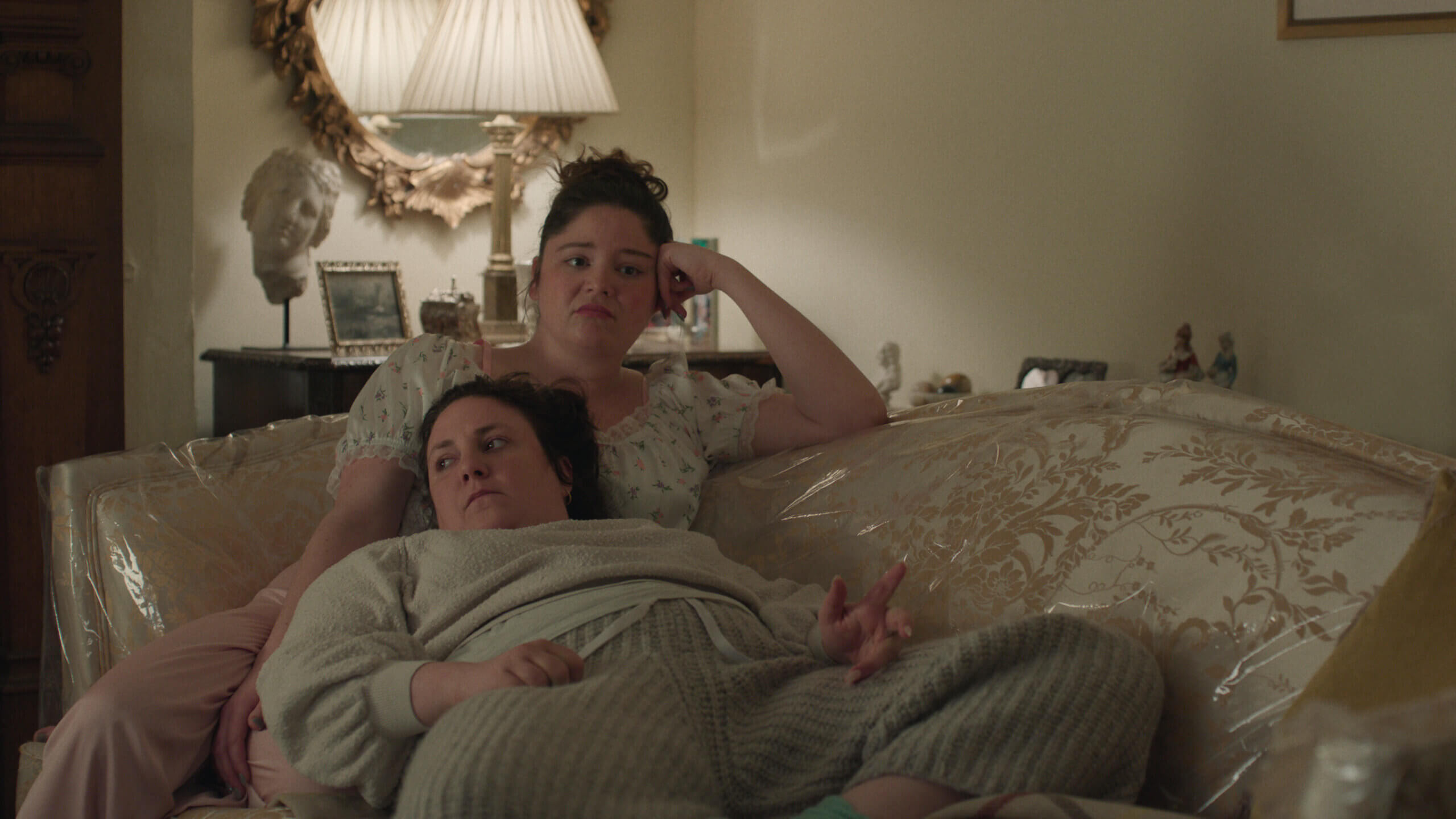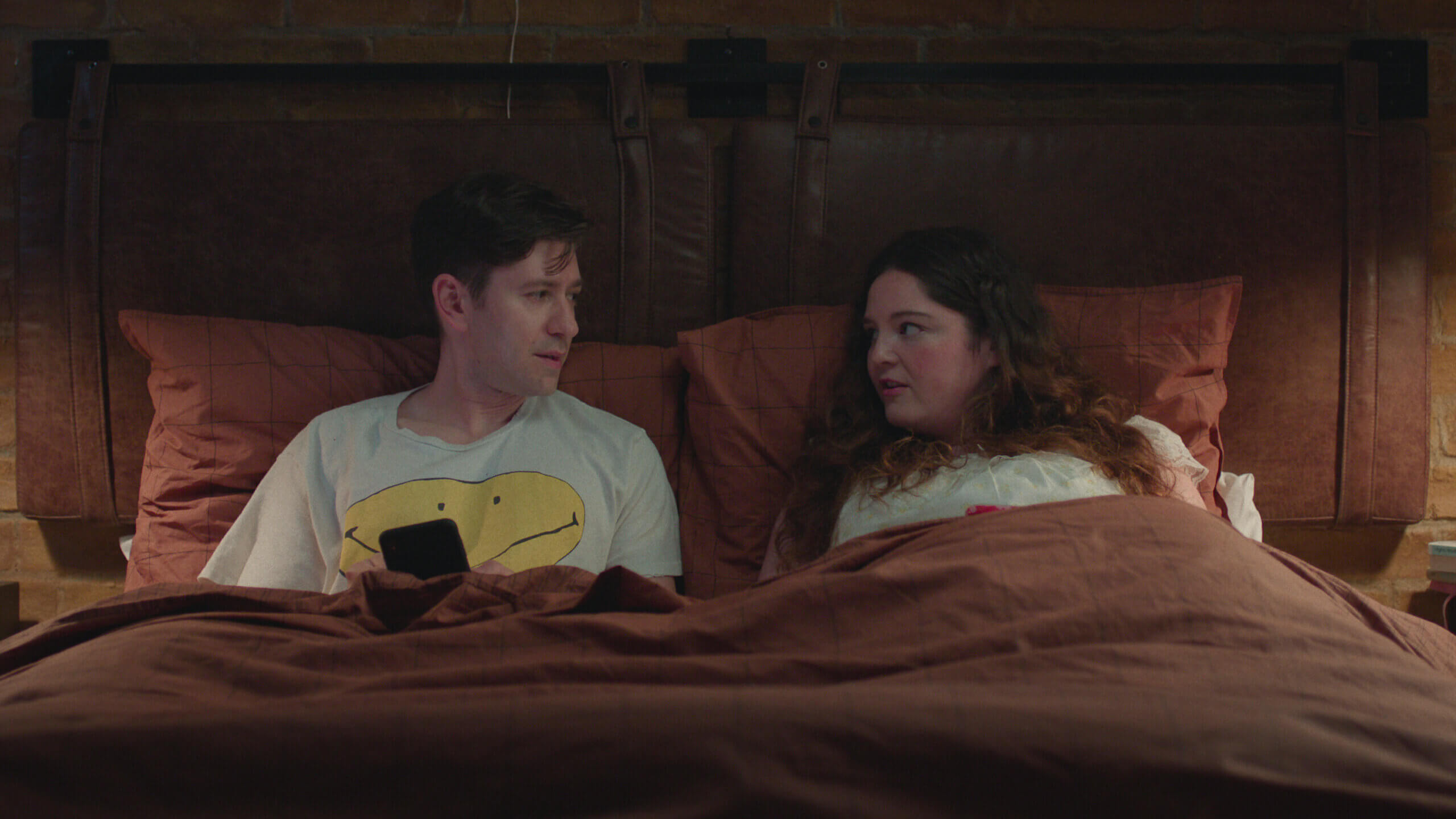Is Lena Dunham’s latest show doing too much — or not enough — with its Jewish characters?
‘Too Much,’ now on Netflix, plays around with the rom-com formula, but leans into some overdone tropes

On her way to London with her hairless dog, just like any super normal girlypop looking for love. Photo by Netflix
Fundamentally, Too Much, the newest TV show from Lena Dunham, is a classic rom-com. Sure, it subverts the genre; Jessica (Meg Stalter) is not thin and has a penchant for unflatteringly voluminous dresses, and her quirkiness goes far beyond the classic “tee-hee I’m so clumsy” level. Its leading man, Felix, instead of being generically handsome and charming, is a small-time musician with a cocaine habit, played by a moody Will Sharpe. Still, Too Much follows the main arcs of a rom-com to a tee: girl has bad breakup, meets new man, falls in love via a series of misadventures.
But I’m less interested in the rom-com tropes it plays with. I’m interested in the show’s Jewish tropes. There are, of course, plenty of Jewish stereotypes to choose from, most of which have also been overused, overanalyzed and just generally beaten to death. We see almost all of them deployed by the end of the first episode.
We meet Jessica immediately after her breakup with her ex, whose name is Zev. Zev is, of course, Jewish; in fact, he’s the very epitome of the nebbishy Nice Jewish Boy who turns out not to be so nice and is, instead, in desperate need of therapy. (He’s played by Michael Zegen, who you may recognize from The Marvelous Mrs. Maisel, where his character, Joel, could be described rather similarly.)
In the opening episode, as Jessica convalesces after being dumped, her tone-deaf mother and grandmother swoon over Zev. (Here, we have the Overbearing Jewish Mother, played by Rita Wilson, and the Bubbe With No Boundaries, played by Rhea Perlman.) After the grandmother worries about how everyone in the family has married a Christian man — apparently this is to blame for the family obsession with “boring goyische pictures,” by which she means British period dramas — she muses about her own crush on “that Zev,” who is “so funny” and has an “erotic smell.” She advises Jessica to try to get him back.

She doesn’t; she moves to London instead, to live out the Mr. Darcy-by-way-of-Bridgerton fantasies she believes she’s entitled to (cue the Jewish American Princess). The rest of the series concerns itself with Jessica’s mental health issues, relationship traumas and poor decisions, which are bogglingly myriad. We basically never hear Judaism referenced again. But, of course, from this brief family conversation, we understand that the family is very Jewish. Presumably, we’re being told that for a reason. And this informs how we read the entire rest of the show.
Jessica is, as the show’s title says, too much — much like Hannah Horvath from Girls and most of Dunham’s leads ever since — and feels a lot like Dunham herself, as many of her characters do. She is constantly putting her foot in her mouth in ways that go far beyond cute mistakes, like taking over a work dinner by talking about her recurring urinary tract infections. One of the framing devices of the show is Jessica’s obsession with making social media videos talking about — or, really, to — Wendy, Zev’s new, hot influencer girlfriend (played by real-life hot influencer Emily Ratajkowski) as though she is an imaginary friend. This is already stalker behavior, but she also has a habit of filming them in places she can be easily overheard by, say, her new coworker or her boss’s wife. In the show’s opener, she breaks into Zev’s house while he’s sleeping in bed with Wendy and screams at them for ruining her life.
The rom-com genre is full of women who are flawed. But usually, those flaws are actually quite socially acceptable and completely normal, maybe even charming; maybe they’re workaholics, or a little insecure, or a tomboy. Maybe they’re simply single at the spinster age of 30. Usually, the movie or show sets this up so they can resolve it into a happily ever after — look, she put on makeup and became hot! She found a man who supports her career aspirations and got that big promotion! Love can save us all!

Jessica, on the other hand, is actually unhinged. The things she does — a home invasion! — are not charming or even remotely OK. Yet, the show suggests, this, too, is human, deserving of love and a happy ending. Jessica does not stop being crazy. Love does not save her. She has some real work to do, regardless of her relationship status. But you don’t have to have finished the work to be lovable. (In any case, her man is none too perfect either, a drifting softboy who lies and cheats. Yet none of that makes their love any less romantic.)
Yet even as Too Much plays with its rom-com tropes, it leans into the Jewish ones. It’s hard not to feel that the only reason we are told so straightforwardly that Jessica is Jewish, in the very beginning of the show, is so that we will understand why she acts so deranged.
It also bears noting that she only manages to find love when she leaves the Jewish boy behind. And on the topic of said Jewish boy, Zev’s main moment of character development is when we see him on a therapist’s couch, complaining about his own overbearing Jewish mother and how her parenting is responsible for all of his problems.
It leaves me wondering what the sparse Jewish references were adding to the show. We never see Jessica flashing back to her bat mitzvah or talking about how much she loved Annie Hall — and she talks about so many other classic rom-coms! — or even being really into fashion icon Iris Apfel. (Which, to be clear, she definitely would be! Jessica loves a loud outfit.) Judaism only comes up in the show in the context of people behaving poorly, whether it’s Jessica’s dysfunctional family or Zev’s manipulative behavior. Couldn’t they all be kind of cuckoo without having to be Jewish?

The show gives its characters so much depth and grace; Jessica is crazy but she’s also professionally successful, has close friendships and is loved. Felix is a burnout with drug issues who is also deeply sweet and sensitive, and shows up when it matters. Even Zev is allowed a few moments of charm. Why wasn’t the characters’ Judaism just as nuanced?
It’s easy to read Too Much as an autobiographical work about Dunham’s breakup with songwriter Jack Antonoff and subsequent marriage to British musician Luis Felber. And it probably is; the events map pretty perfectly, right down to Jessica having to give up a beloved dog just as Dunham did. So maybe Jessica is Jewish because Dunham is, and Zev is Jewish because Antonoff is, and the depictions of both are straight out of Dunham’s own relationship to her Jewish upbringing and her Jewish ex-boyfriend.
Unfortunately, Dunham has a mixed track record on talking about Jewishness. A 2015 satire column she wrote for The New Yorker titled “Dog or Jewish Boyfriend: A Quiz” drew a fair amount of criticism, and relied on many of the same stereotypes as the show.
But the writer-director is known for digging into tough topics; however much she has put her foot in her mouth, she keeps seeking to complicate her subject matter. She is famous for exploring her relationship to her weight, which she never shies away from. Her depictions of sex include all of its awkwardness and lack of grace, yet retain its desirability. She interrogates and subverts expectations of femininity in all of her work, whether it’s Too Much or Girls.
I wish Dunham would turn that critical lens on Judaism, and find richness there, beyond being nebbish and neurotic. I guess I could argue that because Jessica finds love through her flaws, her stereotypical Jewish dysfunction is portrayed as lovable too. But I just believe that there’s more to Judaism than that — plenty of positives and, yes, negatives too. I’m just begging for some new ones.
















